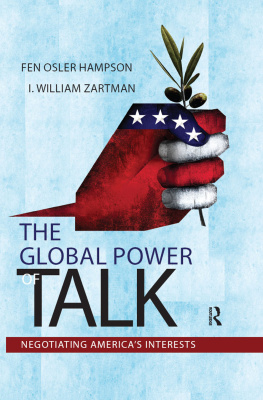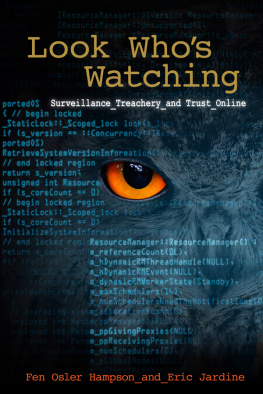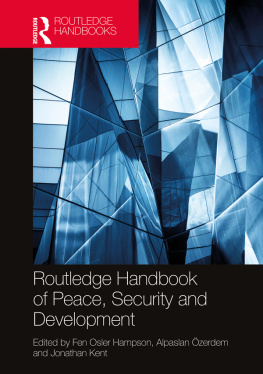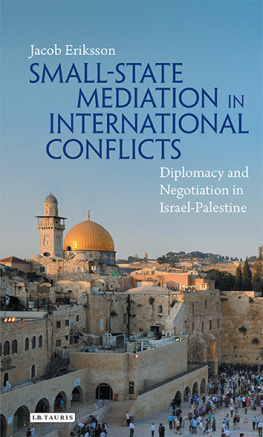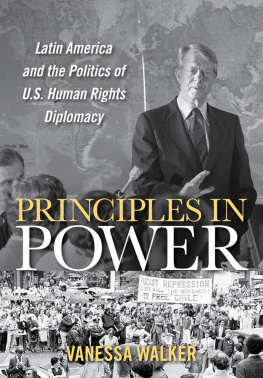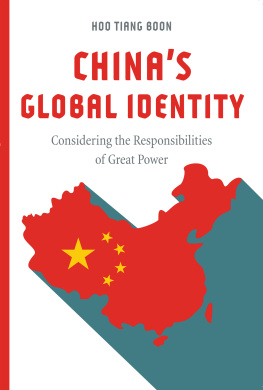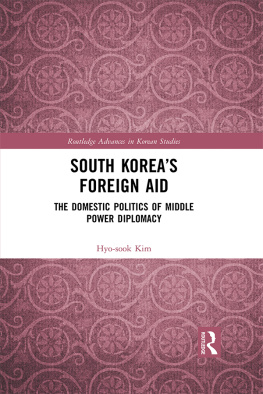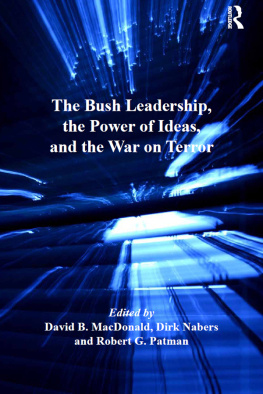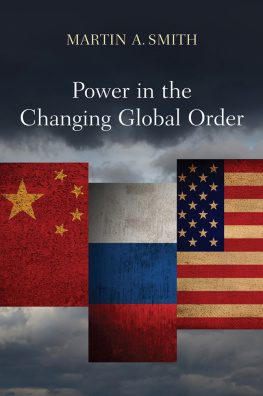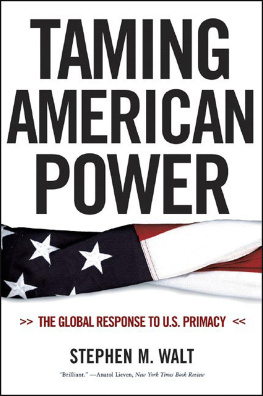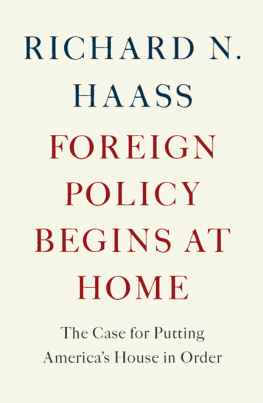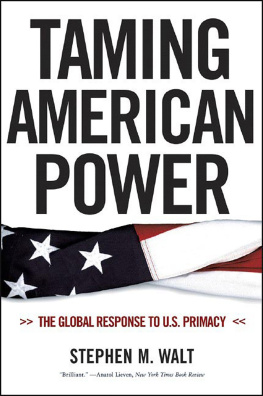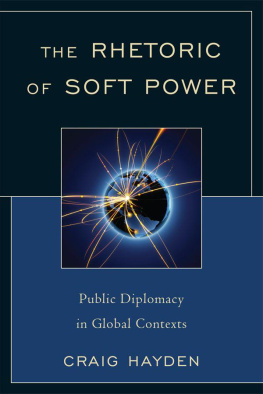THE GLOBAL POWER OF TALK
THE GLOBAL POWER OF TALK
NEGOTIATING AMERICAS INTERESTS
FEN OSLER HAMPSON AND I. WILLIAM ZARTMAN
First published 2012 by Paradigm Publishers
Published 2016 by Routledge
2 Park Square, Milton Park, Abingdon, Oxon OX14 4RN
711 Third Avenue, New York, NY 10017, USA
Routledge is an imprint of the Taylor & Francis Group, an informa business
Copyright 2012, Taylor & Francis.
All rights reserved. No part of this book may be reprinted or reproduced or utilised in any form or by any electronic, mechanical, or other means, now known or hereafter invented, including photocopying and recording, or in any information storage or retrieval system, without permission in writing from the publishers.
Notice:
Product or corporate names may be trademarks or registered trademarks, and are used only for identification and explanation without intent to infringe.
Library of Congress Cataloging-in-Publication Data
Hampson, Fen Osler.
The global power of talk : negotiating Americas interests / by Fen Osler Hampson and I. William Zartman.
p. cm.
Includes bibliographical references and index.
ISBN 978-1-59451-942-0 (hardcover : alk. paper)ISBN 978-1-59451-943-7 (pbk.: alk. paper)
1. United StatesForeign relations. 2. United StatesForeign relations1989 3. Diplomatic negotiations in international disputes. I. Zartman, I. William. II. Title.
JZ1480.H36 2011
327.73dc23
2011021285
Designed and Typeset by Straight Creek Bookmakers.
ISBN 13 : 978-1-59451-942-0 (hbk)
ISBN 13 : 978-1-59451-943-7 (pbk)
Talk Power is the power of negotiation when used skillfully and well. It is a vital but underutilized tool of statecraft in the post-9/11 world. It should be a key instrument for promoting global economic and political security in an era where there are obvious limits to the use of military power in dealing with the multiple problems of terrorism, rogue states, failed states, intractable conflicts, nuclear proliferation, and the continuing fallout from the global economic crisis of 20082009. How precisely should Talk Power be used? This book argues that an extraordinarily rich variety of Talk Power tools can be deployed to deal with the many global challenges that the United States now confronts. The challenge for US foreign policy is to make effective use of the different tools in its negotiation toolbox to advance its interests and promote global security.
Since the first Gulf War of 1991, the United States has relied heavily on Gun Power to advance its core national interests when the right mix of Talk Power tools and instruments could have sometimes achieved better results at vastly lower cost. Today, at a time when fiscal and debt pressures loom large and US capacities to project its military power abroad are increasingly constrained, diplomacy will take center stage and be central to US engagement in the world. Talk Power has a critical role to play here if US diplomacy is to be effective and ensure US primacy.
Understanding the key lessons of the successful application of Talk Power is a crucial first step in advancing US interests, power, and standing in the world. As we argue in this book, Talk Power is not an instrument for the weak, inept, or faint of heart. It offers a set of tools that, when used skillfully and nimbly as part of sustained and coherent diplomatic offensive, can make America strong. Throughout much of the Cold War and occasionally afterward, Americas power and standing in the world derived from its adept and timely use of Talk Power to advance its national interests, thwart rivals, squash enemies, court allies, defuse regional and global tensions, and effectively manage a succession of international crises. In the second decade of the twenty-first century, Americas challenge is to relearn from this legacy and deploy its full arsenal of Talk Power tools to deal with the many global challenges it now confronts.
In writing this book, we have tried to popularize some of the key concepts that come from more than forty-five years of systematic study and research on negotiation and international negotiation processes in the hope of making some of the key ideas about the what, where, and how of negotiation accessible to a wider audience. Much of this research has been led by the Processes of International Negotiation Program, founded by Howard Raiffa, which for many years resided at the International Institute of Applied Systems Analysis in Vienna and has now moved to Clingendael (the Netherlands Institute of International Affairs). We would like to express our thanks to our many friends and colleagues whose work and keen insights we have greatly benefited from in the course of writing this book.
We also would like to thank Isabelle Talpaing-Long and Simon Palamar, who provided invaluable research assistance and editorial guidance in preparing the manuscript.
As we were completing this book, we were dismayed to learn that the United States Institute of Peace, a nonpartisan, Congressionally funded think and do tank, which is Americas premier institute committed to the study, research, and practice of diplomacy, might fall victim to budget cuts just after it had moved into its stunning new headquarters facing the State Department and Lincoln Memorial on the Washington Mall. This would be a tragedy of mammoth proportions and, to say the least, would damage Americas standing and reputation in the world. The Institute has been blessed to have been led by some of Americas leading diplomats and practitionersindividuals who have successfully advanced Americas interests and standing in the world through the successful use of Talk Power. We are therefore pleased to dedicate this book to them: Sam Lewis, who served as the Institutes president until 1993; Richard Solomon, who succeeded him; and Chester Crocker, who until recently was a chair of the Institutes board of directors.
Men nowadays are becoming more and more convinced that any disputes which may arise between nations must be resolved by negotiation and agreement, and not by recourse to arms.
John Paul II, Pacem in Terris, 1963, Para 126
You can do a lot with diplomacy, but of course you can do a lot more with diplomacy backed up by firmness and force.
Kofi Annan, New York Times, February 23, 1998
This book challenges two myths: that when America chooses the diplomatic path and tries to negotiate with its enemies it does so out of weakness, and that to stay the strong, sole-standing superpower, the United States has to rely above all on its military might. It is negotiation or Talk Power, as we argue in this book, that when wielded wisely is the most used and the most powerful tool in Americas arsenal. Negotiation is getting something by giving something, and in international conflicts it is the search for solutions that meet the foreign policy goals of one country while giving enough to another to motivate it to keep its promises. It is a tool that can be used to advance Americas interests, amplify Americas power and standing in the world, and win back old friends who have lost faith in its leadership. It is a tool that can forge new alliances to deal with todays new security threats. In short, it is a tool that can do, and on occasion has done, much to advance Americas global positions and the cause of world peace. Talk Power is not the refuge of the weak. On the contrary, it is the fine-honed instrument of the hard-headed and tough-minded who understand its uses, purpose, and limitations.

